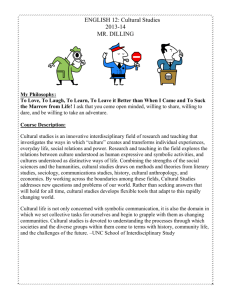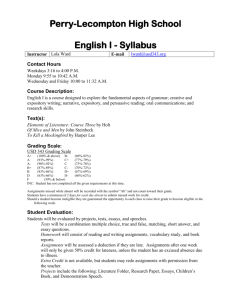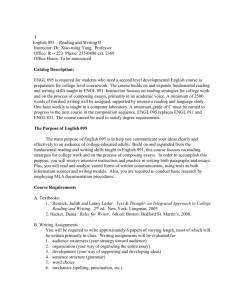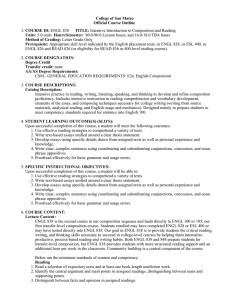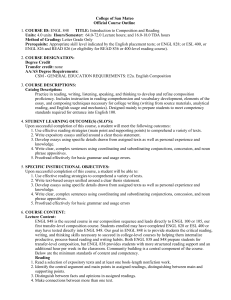College of San Mateo Official Course Outline COURSE ID: Units:
advertisement
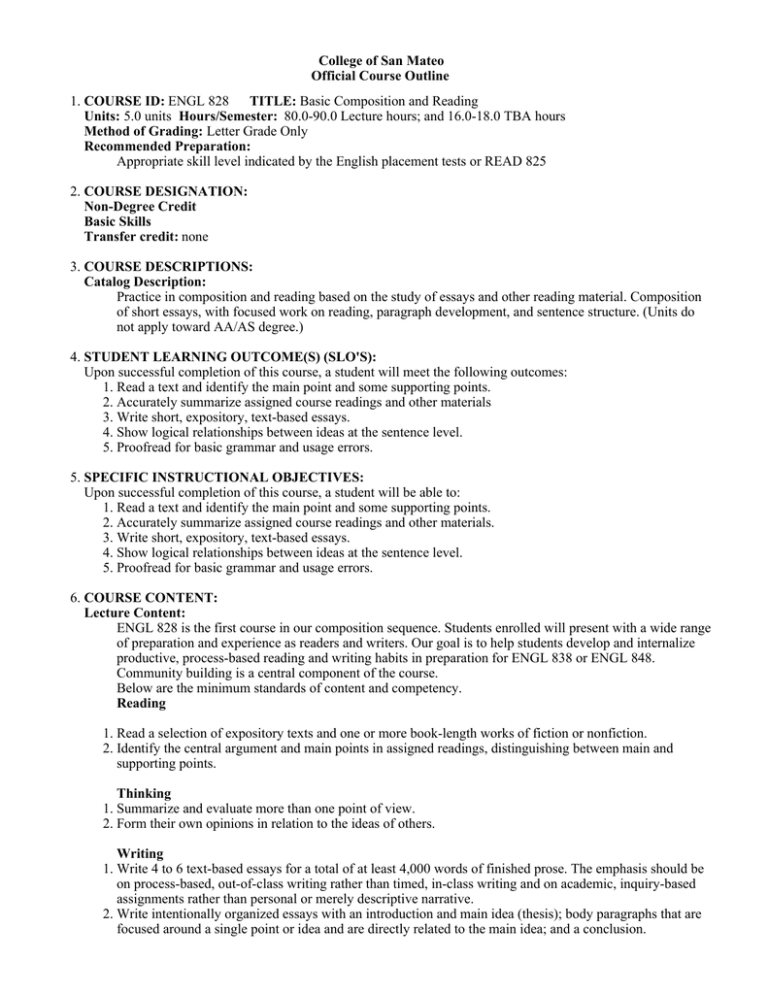
College of San Mateo Official Course Outline 1. COURSE ID: ENGL 828 TITLE: Basic Composition and Reading Units: 5.0 units Hours/Semester: 80.0-90.0 Lecture hours; and 16.0-18.0 TBA hours Method of Grading: Letter Grade Only Recommended Preparation: Appropriate skill level indicated by the English placement tests or READ 825 2. COURSE DESIGNATION: Non-Degree Credit Basic Skills Transfer credit: none 3. COURSE DESCRIPTIONS: Catalog Description: Practice in composition and reading based on the study of essays and other reading material. Composition of short essays, with focused work on reading, paragraph development, and sentence structure. (Units do not apply toward AA/AS degree.) 4. STUDENT LEARNING OUTCOME(S) (SLO'S): Upon successful completion of this course, a student will meet the following outcomes: 1. Read a text and identify the main point and some supporting points. 2. Accurately summarize assigned course readings and other materials 3. Write short, expository, text-based essays. 4. Show logical relationships between ideas at the sentence level. 5. Proofread for basic grammar and usage errors. 5. SPECIFIC INSTRUCTIONAL OBJECTIVES: Upon successful completion of this course, a student will be able to: 1. Read a text and identify the main point and some supporting points. 2. Accurately summarize assigned course readings and other materials. 3. Write short, expository, text-based essays. 4. Show logical relationships between ideas at the sentence level. 5. Proofread for basic grammar and usage errors. 6. COURSE CONTENT: Lecture Content: ENGL 828 is the first course in our composition sequence. Students enrolled will present with a wide range of preparation and experience as readers and writers. Our goal is to help students develop and internalize productive, process-based reading and writing habits in preparation for ENGL 838 or ENGL 848. Community building is a central component of the course. Below are the minimum standards of content and competency. Reading 1. Read a selection of expository texts and one or more book-length works of fiction or nonfiction. 2. Identify the central argument and main points in assigned readings, distinguishing between main and supporting points. Thinking 1. Summarize and evaluate more than one point of view. 2. Form their own opinions in relation to the ideas of others. Writing 1. Write 4 to 6 text-based essays for a total of at least 4,000 words of finished prose. The emphasis should be on process-based, out-of-class writing rather than timed, in-class writing and on academic, inquiry-based assignments rather than personal or merely descriptive narrative. 2. Write intentionally organized essays with an introduction and main idea (thesis); body paragraphs that are focused around a single point or idea and are directly related to the main idea; and a conclusion. 3. Write clear and understandable sentences; use coordinating and subordinating conjunctions accurately and 3. Write clear and understandable sentences; use coordinating and subordinating conjunctions accurately and effectively. 4. Proofread effectively for correct subject-verb agreement, basic verb tense usage, and spelling. TBA Hours Content: Students will use the English 800 Center to reinforce these specific instructional objectives. ENGL 828 has a TBA (To Be Arranged hours) requirement. These TBA hours are instructional activities designed to help improve students’ reading and writing skills. They are required to complete the activities in 18-102 or 18-104 and to log in and out of the attendance tracking system every time they work on one of the activities. Activities include orientations, one-on-one conferences with English instructors, tutorials on specific writing and critical thinking skills, and group workshops. 7. REPRESENTATIVE METHODS OF INSTRUCTION: Typical methods of instruction may include: A. Lecture B. Directed Study C. Activity D. Critique E. Discussion F. Field Trips G. Guest Speakers H. Individualized Instruction I. Observation and Demonstration J. Service Learning K. Other (Specify): Methods should include the following: 1. Building community in the classroom: create a sense of community in the classroom to promote student investment in the course and to build students’ confidence. Also, collaborate with counselors to help students access available appropriate services EOPS, DSPS, financial aid, psychological services, Associated Students. 2. Creating collaborative, student-centered classrooms: facilitate small group work on sentence building strategies, reading comprehension and responses, pre-writing activities, and critical response to writing in progress 3. Inductive rather than prescriptive teaching when appropriate: encourage and help students to reach their own conclusions and to make decisions about their writing rather than direct them explicitly 4. Schema building: introduce students to essay topics/issues through class discussion, journals and/or free-writing in order to activate and build upon their prior knowledge 5. Focused reading: assigned reading questions, reading journals, annotation strategies, pre-reading and prediction strategies, metacognitive awareness activities 6. Structured whole-class discussion: help students understand assigned course material and build critical thinking strategies through instructor-guided discussion of course readings and writing assignments 7. Scaffolding of writing assignments: help students break down the writing process and individual assignments into distinct manageable steps, each of which builds on the ones before it 8. Modeling: use models of student and professional writing to introduce, teach and reinforce effective writing strategies 9. Sentence-level instruction: teach sentence skills, including the rules of grammar and usage, in the context of students' writing, while reinforcing these skills with in-class exercises and homework assignments 10. Individual instruction: one-on-one student-teacher conferences 11. Peer review workshops: students share and critique each other’s writing 12. Lecture: provide relevant or necessary background information for writing assignments; explain reading strategies and principles of clear, effective writing 8. REPRESENTATIVE ASSIGNMENTS Representative assignments in this course may include, but are not limited to the following: Writing Assignments: Written essays (a minimum of 4,000 words) to demonstrate an understanding of course material and the writing process. Journal writing, summaries, and other responses to assigned readings to demonstrate understanding and systhesize of reading. Please see attached files. Reading Assignments: Students read a selection of expository texts and one or more book-length works of fiction or nonfiction. Reading assignments may include reading questions, double-entry journals, short reflection papers, small group and whole class discussion of assigned texts. To be Arranged Assignments: Assignments--which must be completed in the English 800 Center or the Writing Center--include orientations, one-on-one conferences with English instructors, tutorials on specific writing and critical thinking skills, and group workshops. 9. REPRESENTATIVE METHODS OF EVALUATION Representative methods of evaluation may include: A. Class Participation B. Class Work C. Exams/Tests D. Group Projects E. Homework F. Papers G. Portfolios H. Projects I. Quizzes J. Written examination K. **ESSAYS SHOULD CONSTITUTE AT LEAST 70% OF THE FINAL COURSE GRADE. 10. REPRESENTATIVE TEXT(S): Possible textbooks include: A. Robinson, William and Pam Altman. Integrations: Reading, Thinking, and Writing for College Success, ed. Cengage, 2003 B. Condie, Ally. Matched, ed. Speak, 2011 C. Alexie, Sherman. Flight: A Novel, ed. Grove Press, 2007 D. Altman, Pam. Sentence-Combining Workbook, 4th ed. Cengage, 2014 E. Yezierska, Anzia. Bread Givers, ed. Persea, 2003 F. Robbins, Tim and Helen Prejean. Dead Man Walking (Newmarket Shooting Script), ed. Newmarket Press, 1999 G. Downing, S.. On Course: Strategies for Creating Success in College and in Life, 7 ed. Cengage, 2013 Origination Date: August 2010 Curriculum Committee Approval Date: January 2015 Effective Term: Fall 2015 Course Originator: Katherine James



